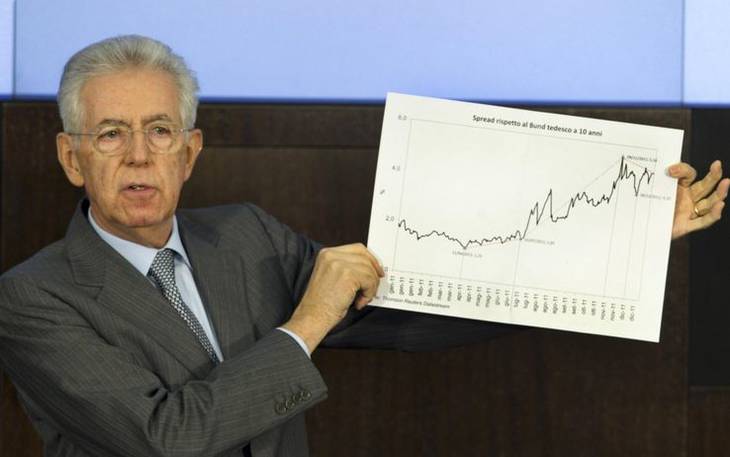


ROME - The seriously overweight gentleman in a bathing suit was sprawled in a chair at the edge of the beach and dozing this morning on Lake Bracciano, when a friend approached and asked, "Are you sleeping life away?" The reply, in Roman dialect: "Whadda ya want? I've got the spread."
So does a lot of Italy. The upward surge of the spread to today's 506.48 for 10-year bonds (but 519 at the opening of the markets) has reignited interest in holding elections this November, six months ahead of schedule. The emergency premier Mario Monti reportedly [2] told President Giorgio Napolitano Wednesday that, "My government has done what it could." (A cautionary note: in citing this in quotes the Italian press used the ambiguous words "avrebbe detto," or "seems to have said.")
Whether or not these were Monti's precise words, they definitely express a darkening mood. Although the Monti government enjoys international prestige, including from the U.S., at home Monti has lost some of the popularity his government had when it came to power last November. The same happens to politicians everywhere when reality challenges the early political glow, but here the sense of disillusionment is aggravated, both by falling unemployment (at 10.1%, down 2% over just a year ago) and by the realization that the fiscal pressure on Italians already stands at 53% or more.
"The global scenario has turned worse," according to a new report by Confindustria [3], the national association of manufacturers, which predicts that the GDP will continue to decline. "As the second trimester comes to an end the negative indexes annul the probability of a relaunch within the year." Furthermore, the report continued, Europe itself is in a downward spiral due to the collapse of the real estate bubble, a reduction in bank liquidity and a drop in consumer spending by families.
A drop in income has hit local administrations in particular, whose incomes shrank by 7% in 2011 over 2010, putting cities like Rome and Naples at risk of being unable to pay full wages to their employees in August. Regions, provinces and townships have suffered, altogether, a drop in income of circa 20% in the two years 2010-2011. In protest, earlier this week mayors from townships throughout Italy came into Rome to demonstrate.
"The central government administrations have been hit less than the local by the efforts to contain spending," Luigi Giampaolino, president of the Corte dei Conti [4], told the Budget Commission of the Chamber of Deputies yesterday. According to this public spending oversight body, local administrations are, more than the national government, "very exposed to restrictions and limitations" upon actions to defend their incomes through investments. As a result, the national budget decreased by only 6% because income from state investments rose by 12.3%, helping to offset the 18% drop from other income sources over the same period.
Not surprisingly, former Premier Silvio Berlusconi's entourage is not losing the opportunity to point out that, if the spread is up again, this proves that Berlusconi took the blame unfairly for its earlier high tide level. Moreover, in an interview with the German tabloid Bild [5], Berlusconi boasted that, "If Italy's public accounts are now back under control, it is largely thanks to my government." Berlusconi also took credit for acting in the national interest in leaving the premiership. "I wanted to enable constitutional and other reforms to be approved."
And indeed the remnants of his Partito della Liberta' (PdL) are themselves surging into the piazza in Milan Wednesday afternoon, for an event entitled "Sognando Forza Italia [6]," or "Dreaming of Forza Italia." Berlusconi's pre-PdL political organization is just being reawakened as a potential successor to the flagging PdL, and with good reason; the PdL, which peaked at 38% in public opinion polls just a few years ago, has now sunk to about 20%.
If this is the beginning of the end, does this mean the end of Monti himself? Not necessarily, for it is just possible that the politicians--depending upon who is in charge after November--put him back in place but with greater political clout. At the moment the stalemate over a new election law to replace the discredited law in vigor now may be breaking, even though the comic and popular political bad boy Beppe Grillo maintains that the only reason some want it changed is so that his action party, which is running third in the polls behind the Partito Democratico of Pier Luigi Bersani (over and Berlusconi's PdL, will not take benefit from the present law, nicknamed the Porcellum (pigsty law).
And meanwhile, as Rome burns, the summer holiday ritual of a long vacation is chilling out, if slowly. In interviews with 6,000 Italians the number of those staying at home of necessity rose by 2%, from 11% to 13%. They are burning the home fires, at least; only one of six is traveling abroad.
Source URL: http://iitaly.org/magazine/focus/facts-stories/article/summer-spreads-out-spread
Links
[1] http://iitaly.org/files/33989monti-spread1343426013jpg
[2] http://www.ilfattoquotidiano.it/2012/07/26/monti-a-napolitano-il-mio-governo-ha-fatto-quello-che-ha-potuto/306199/
[3] http://www.confindustria.it
[4] http://www.corteconti.it
[5] http://www.bild.de/news/bild.../bild-com/home-19858064.bild.html
[6] http://www.ilgiornale.it/news/milano/sognando-forza-italia-va-piazza-825886.html